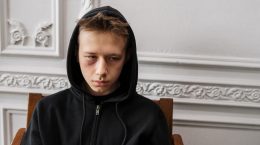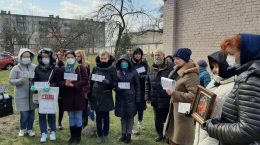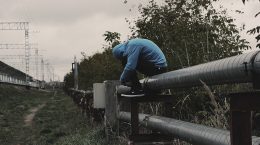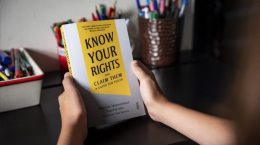The guys who at the age of 14-16, according to the state, became drug lords and therefore deserve huge terms for organizing a group for the distribution of drugs, are invisible to society. In prisons they are left alone, supported only by family and friends who try to prove to the authorities that their children are not to blame and have been caught hooked. However, they are rarely heard, and requests to revise the legislation do not end with success. Therefore, human rights defenders of the ICCI “Our House” joined the fight for the children who received sentences under this article. A look back at the history of the Campaign for Children-328.
On April 16, 2019, we managed to reclassify Yulian Kurzhalov‘s case from part 3 of article 328 to part 1 of article 328. The judge sentenced the youth to 2.6 years of home arrest. It means that the 2.6 years he has to live with his parents. Those who are at least a little familiar with the specifics of the Belarusian justice know that judges do not usually “jump over” parts. At best they reduce the punishment by one part within the framework of one article of the Criminal Code.
On 30 September 2019, ICCI “Our House” posted information about an urgent action by the international human rights organization Amnesty International in support of juveniles convicted of minor non-violent drug offences. The action was initiated after a person sentenced to 10 years in prison under Art. 328 of the Criminal Code Vladislav Sharkovsky did not receive medical assistance, which is why he developed chronic diseases. The boy’s mother complained about the lack of medical care and in response she was threatened that her son would be placed in an isolation cell. In this regard, ICCI “Our House” demanded the immediate release of all juvenile convicts under Article 328 and provide them with the necessary medical assistance and protection from any form of persecution and repression. The General Prosecutor’s Office of Belarus almost immediately reacted to the situation, promising to investigate the reasons for not providing medical assistance to Vladislav Sharkovsky.
In October 2019, Amnesty International supported another campaign of ICCI “Our House”. The “Write for Rights” campaign was aimed at supporting juvenile prisoners convicted of drug-related crimes. The people wishing to do so were asked to sign their demands to the Belarusian government by indicating their name, surname and country of residence. The signatories demanded to stop imposing imprisonment sentences on minors for minor non-violent drug-related offenses.
On 16 October 2019, ICСI “Our House” participated in the drafting of the Law “On Amnesty 2020”. The following points were added to the draft: the amnesty should be applied to all minors without exception on the day of arrest, regardless of the appointed term of conviction, as well as to orphans under 21 years of age. The administration of penitentiary institutions cannot interfere with amnesty, including for convicts declared in prison institutions as persistent violators. On October 30 of the same year, project proposals were sent to 15 government agencies.
On 24 October 2019, thanks to the efforts of ICСI “Our House”, 11 female representatives of relatives of those convicted under Article 328 of the Criminal Code and activists of the campaign “Children-328” got to meet Natalya Kochanova. This was the first meeting attended by the mothers of convicted juveniles. The conversation touched upon acute problems: harsh treatment of children in prisons, amnesty that does not apply to prisoners under the age of 18; courts which base their decisions on the recommendations of plenums 20 years ago. Natalya Kochanova promised that all issues will be considered at meetings with law enforcement agencies.
On November 30, 2019, ICCI “Our House” proposed to support children in prisons under Article 328 with letters. The face of the campaign “Marathon of Letters” was Emil Ostrovko, who, having decided to earn some money as a distributor of smoking mixtures, received 10 years in prison. The activists of the ICCI “Our House” have compiled a map of addresses where you can write letters to imprisoned adolescents.
In December 2019, activists of the Children-328 campaign attended a personal reception with Vadim Ipatov, director of the National Center for Legislation and Legal Research of the Republic of Belarus. They asked for clarification on what actions are planned to be carried out under the presidential “mitigation program”, talked about the circumstances, qualifications, application of the legislation and the terms of punishment under Article 328. Although Vadim Ipatov said that his department only creates laws, he advised to apply for an explanation to the Supreme Council and the General Prosecutor’s Office.
On December 12, 2019, a picket of activists of the ICCI “Our House” and the campaign “Children-328” took place in Minsk. Thus, the mothers tried to draw attention to the unfair sentences under Part 4 of Article 328 of the Criminal Code. During the picket, the activists drew attention to the fact that the sentences in this regard are illegal, because they lack evidence of participation in organized groups and the chemical synthesis of drugs.
On December 30, 2019, a joint appeal of the UN Special Rapporteurs to the government of Belarus on the situation with “children-328” was published. In preparing the letter, the materials of the Children-328 campaign of the ICCI “Our House” were used. Special experts highlighted violations in the application of anti-drug legislation to minors: lack of alternatives to detention and imprisonment, failure to inform parents in time, insufficient evidence, poor conditions in prisons, lack of medical care, restrictions on access to education, torture of minors, hazardous work for paltry wages. Also, the Special Rapporteurs offered the Belarusian authority’s options for solving the problem: amnesty for minors, reduction of the term of imprisonment for those under 18, revision of the “anti-drug” legislation.
On January 29, 2020, in Bobruisk, the process began to consider the complaint of a minor convicted under Article 328 Emil Ostrovko. The guy will appeal against the disciplinary sanctions imposed on him by the employees of the educational colony No. 2, because of which he received the status of a “villain” and could not fall under the amnesty. Representatives of ICCI “Our House” were also present at the trial. Emil’s interests were represented by his mother, who said that children in the educational colony of Bobruisk were given too little time for morning procedures, and Emil, who has bronchial asthma, had to work in a workshop with rubber from old tires for the extraction of steel cord. He is not allowed to have a medicine bottle. On April 13, 2020 it became known that the Mogilev Regional Court sided with the colony workers in this case.
In February 2020, ICCI “Our House” and ADC “Memorial” prepared a report for the Special Rapporteur on Human Rights in Belarus. It listed topical issues that affect the rights of vulnerable groups, in particular – children-328. Для работы над ошибками беларусским властям предложили реформировать систему уголовной ответственности за преступления, связанные с наркотиками, обеспеченить гарантии справедливого судебного разбирательства в рамках уголовного судопроизводства, провести независимый мониторинг пенитенциарной системы.
On February 19, 2020, activists of the “Mother-328” movement met with deputy Oleg Belokonev, chairman of the standing commission on national security. It is he who presents the bills that concern convicted children. Oleg Belokonev was asked to adopt laws that would prevent teenagers from being sentenced to eight to ten or more years of imprisonment without proven guilt in the trial. The general was also told about four detachments of girls in the women’s colony No. 4, about six hundred online stores in our state, most of which sell drugs. However, during the discussion, Oleg Belokonev made it clear that the National Security Commission did not intend to consider the mothers’ opinion regarding the amnesty.
Information about 328 children was included in a UN Human Rights Council briefing for the Universal Periodic Review (UPR) prepared by Amnesty International in February 2020. The situation was outlined in the section “juvenile justice and fair trial”. The information focused on violations of human rights that law enforcement officers allowed themselves during detention or arrest, on harsh accusations, on the lack of informing legal representatives or lawyers about the detention, and ill-treatment of minors.
On March 18, 2020, Olga Karach appealed to the government of Belarus to resolve the situation with minors convicted under the “drug” article. In connection with the coronavirus pandemic, which Lukashenko denied, children in the colonies lost their visits with their loved ones, but at the same time they were not prohibited from contacting the employees of the colonies, living in a confined space in huge detachments without protective masks and disinfection. Olga Karach demanded that the government of Belarus immediately open prisons and release children-328 home under house arrest for the period until the coronavirus pandemic ends.
On May 8, 2020, UN human rights experts supported ICCI “Our House” in this demand. The Special Rapporteur on Human Rights in Belarus, Anais Marin, and members of the Working Group on Arbitrary Detention stressed that the Belarusian authorities must take urgent measures to protect the health and safety of minors sentenced to disproportionately long prison terms – up to 12 years – for crimes related to drugs.
In the summer of 2020, activists of the “Mother-328” movement went on a hunger strike. Thus, they wanted to draw attention to the fact that children are recognized by the state as drug dealers and are serving sentences of ten or more years in prison. The only possible solution is a mass pardon. During the hunger strike they were supported by the activists of the ICCI “Our House”. Olga Kovalkova, a confidant of Sviatlana Tsikhanouskaya, also arrived at the meeting with the mothers.
In March 2021, through the efforts of the campaign activists and human rights defenders of the ICCI “Our House”, a meeting was held with the deputy of the House of Representatives, member of the Standing Commission on National Security Marina Lenchevska. At the meeting, the mothers of children convicted under Article 328 emphasized that drug-related crimes are non-violent and are unfairly classified as especially dangerous. The activists proposed several amendments, in particular – to restore the age of criminal responsibility from 18 years, to create a category of “juvenile justice”, to reconsider the cases of minors who have already been convicted under Part 4 of Article 328. In relation to minors, it was proposed to apply a lighter sentence and a recalculation of the term of detention. During the reception, Marina Lenchevska supported the activities of the “Mother-328” movement and announced that she was ready to assist. The deputy also asked for cooperation in terms of preventing crimes under Article 328.
From the very beginning of the campaign and to this day, lawyers of ICCI “Our House” have been reviewing cases of unjustly convicted juveniles and providing expert opinions. For example, Emil Ostrovko, while in custody, did not have the opportunity to pass the 11th grade final exams and receive a school leaving certificate. Investigators did not identify the organizers and other members of the group and did not find any drugs in the teenager’s possession, yet Emil received a sentence under the hardest part of Article 328 – Part 4.
Valeria Kupchenya, detained in 2018, was handcuffed and tortured; the court did not consider the positive characteristics of the girl from the place of study. The verdict did not correspond to reality and was based solely on arguments and assumptions.
For Valeria’s friend, a minor Vladislav Sharkovsky, the security forces used physical force during the arrest. The parents learned that their son was in the police five hours later. The characteristics from the places of study, where Vladislav was characterized as responsible and disciplined, were not considered. The court also did not consider the fact that Vladislav is a candidate for master of sports in taekwondo and disinterestedly looked after a disabled person. They also failed to prove that the teenager oversaw an organized drug distribution group, but Vladislav was sentenced under part 4 of Article 328.
Grigory Korotkevich, detained in 2016, was interrogated without the presence of a lawyer, teacher and legal representatives. He was also unable to continue his college studies. The court did not consider his testimony. He was punished under Article 328(3), although the acts he was charged with did not involve violence against another person, or the repeated commission of other serious offences.
The minor Milad Nasser, who became a defendant in the criminal case under Part 4 of Article 328 in 2017, was taken into custody, but the necessity and expediency of such an action was not explained. The police did not study the environment and conditions in which the minor lived, the circumstances of getting into a criminal group that was organized by an unknown person. The serious punishment was also influenced by the fact that Milad had already been convicted under Section 328(1), but the state did nothing to ensure that the teenager in conflict with the law reformed himself. In 2021, Milad’s mother died, and the administration of the penitentiary did not let him say goodbye to her.
ICCI “Our House” continues to monitor the situation with the punishment of minors under Article 328 of the Criminal Code. Moreover, cases of detention of children continue this year as well. Teenagers, who are 14, 15, 16 years old, receive huge sentences as organizers of criminal gangs, and “justice” does not care at all that minors themselves have become victims of experienced criminals who are abroad. It is important to continue the fight so that none of the Belarusian children will ever go to prison for a long term for someone else’s atrocities.









